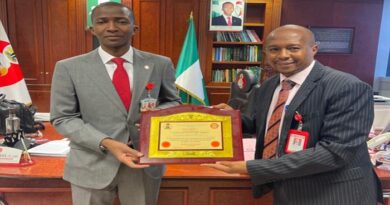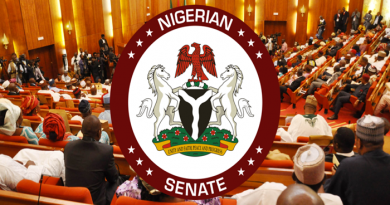Fowler on how FIRS plans to realise its revenue target for 2019
The Federal Inland Revenue Service (FIRS) has said that it plans to realize its revenue target for the year through recoveries from defaulting millionaire taxpayers, Values Added Tax (VAT) and compliance enforcement activities.
The Chairman of FIRS, Mr. Tunde Fowler, speaking at the House of Representatives joint committees on Finance, Appropriations, Aids, Loans and Debt Management Legislative Budget and Research and National Planning and Economic Development reiterated the agency’s revenue collection target for 2019 which puts at about N8 trillion.
He spoke of the hope to realise about N750 billion from about 55,000 defaulting taxpayers during the year.
Fowler, who spoke on the 2019/2021 Medium Term Expenditure Framework (MTEF) and Fiscal Strategy Paper (FSP), said using banking information to bring non-compliant taxpayers with N1 billion and above turnover to comply about N23.25 billion has been recovered so far.
He restated that the 85 per cent of VAT collected goes to State Governments, adding that the exercise has been extended to cover those with turnover of N100 million and above.
“To date, about 500 of the tax defaulters have come forward and have paid about N24 billion. We believe we should be able to go through the 55,000 before the middle of this year.
“In terms of estimates we should be able to be able to generate from this exercise alone about N750 billion.”
Besides, Fowler said the FIRS also expects that the increase in Value Added Tax (VAT) collection between 2015 and 2018 will continue during the year.
He said FIRS was already broadening its VAT collection scope with the adoption of States Accountants Generals (SAG) collection platform, VAT Auto-Collect, integration of the GIFMIS platform with Ministries, Departments and Agencies, (MDAs) and through e-Service payment options.
“Out of about N5.3 trillion, a large percentage of the revenue is shared between states and local governments.’
“In VAT, there has been a growth of over 44 per cent between 2015 and 2018 at the current rate of 5 per cent.
“When you look at Africa as a continent, Nigeria still has the lowest VAT rate. When we look at the items that do not attract VAT, they include basic food items, medicals, and education.
Insisting VAT is not for the poor, Mr Fowler said if one is able to go to a restaurant to eat and drink the same thing one can buy in the open market, then one can pay VAT.
“So, VAT basically is a consumption tax, and those who choose not to go to the open market to buy their food and cook at home are subject to VAT. So, VAT is not a hardship on the low income earners.
“For those who have the ability and the desire to take the choice of going to areas where they have to pay VAT, then they should be allowed to pay VAT,” he said.
He said revenue collection by FIRS increased by about 32 per cent from N4.02 trillion in 2017 to N5.3 trillion in 2018.
The FIRS Chairman told the committee that through enforcement activities in respect of defaulting taxpayers from various tax offices, tax audit and investigation assessments, the agency recovered about N28. 51 billion and $77. 83 million.
Also, the FIRS is partnering with the Economic and Financial Crimes Commission (EFCC) and Joint Tax Force (JTF) since 2018 to enhance the fight against tax related economic fraud.
As at December 2018, he said about N6. 94 billion and $278,430 had been recovered by the JTF as part of initiatives to boost revenue generation.
To deepen tax revenue collection and expand the nation’s tax net as well as increase the revenue base, Fowler said the FIRS also initiated income tax on property owners in Abuja and Lagos.
He said the initiative, which was initially targeted at property owners in Abuja and Lagos, has so far yielded N4.3 billion, and is being extended to other locations like Oyo and Kaduna states.
“It is important to note that this is not a property tax, but rather the use of the provisions of the law to bring into the tax net companies that own properties but failed to file necessary tax returns and pay appropriate taxes due,’’ Mr Fowler said.
On tax audit exercise of the Service, the FIRS chairman said this will cover both the National Tax Audit (NTA) and the Pioneer Audit (PA).
The NTA exercise contributed the sum of N212.79 billion to tax collection in 2018.
Following improvements to the audit process and the resultant increase inefficiency, the exercise is expected to produce increased audit yield in 2019, he assured.




